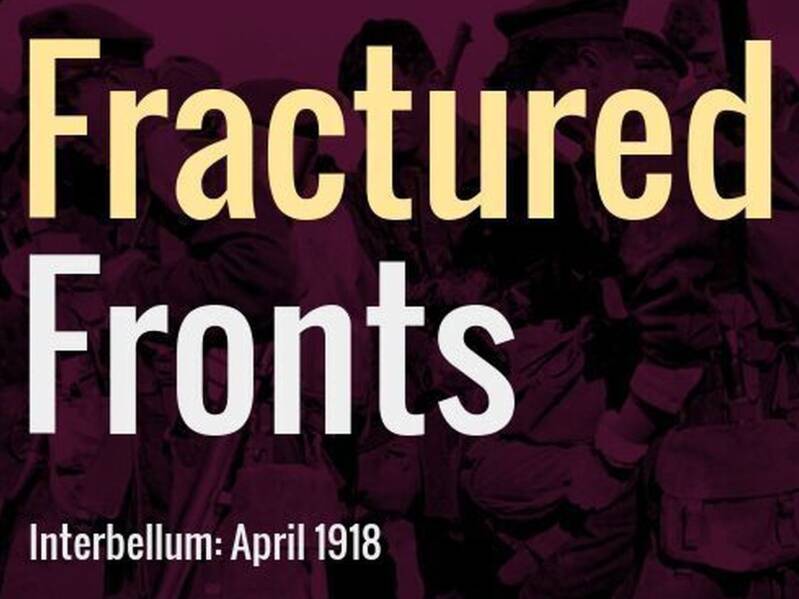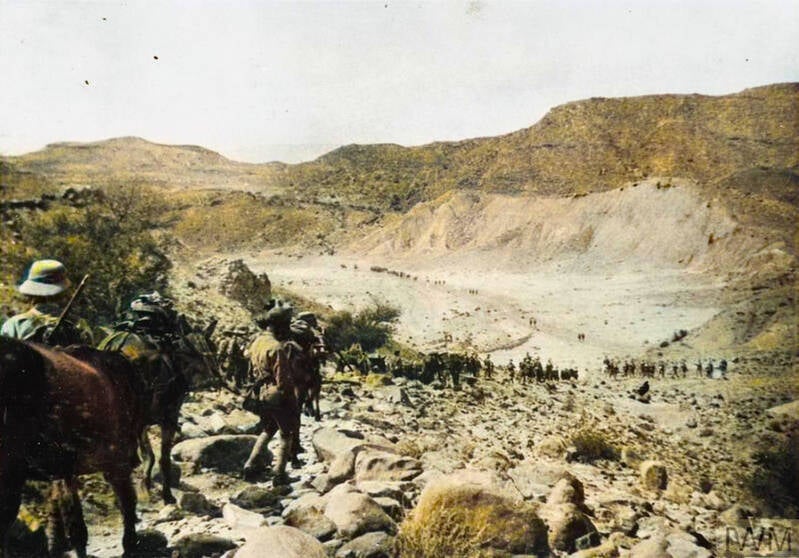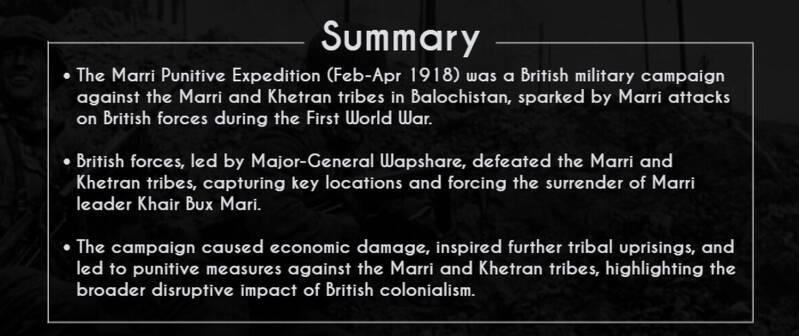Shifting Alliances, Rising Tensions
Foundations of future conflicts amidst the war’s final year
April 1918 was a pivotal month in the broader context of the First World War and its far-reaching consequences.
The period was marked by significant political and military events that shaped the future of Europe and the colonial world.
Among these, the Marri Punitive Expedition in British India demonstrated the enduring tensions of British colonialism, as the British suppressed indigenous uprisings, leading to further instability in the region.
In Europe, the Union of Bessarabia with Romania reflected the shifting borders and national identities as the Russian Empire's grip weakened, laying the groundwork for future conflicts in Eastern Europe.
Troops standing in the shell of a building. By April 1918, the First World War had reached a critical point with Germany's Spring Offensive straining Allied forces on the Western Front, while the collapse of empires and rising nationalist movements across Europe and beyond fueled widespread political instability.
...deep-seated ethnic and political divisions...
The formation of the Transcaucasian Democratic Federative Republic highlighted the emergence of new, yet fragile, states in the wake of the Russian Empire's collapse.
However, this federation quickly dissolved, exposing deep-seated ethnic and political divisions that would continue to influence the region's tumultuous history.
Meanwhile, in Ireland, the Conscription Crisis of 1918 revealed the growing discontent with British rule, catalyzing the movement for Irish independence and setting the stage for the Irish War of Independence.

Aftermath of the Burning of Cork by the British during the Irish War of Independence, 1922. The Conscription Crisis of 1918 intensified Irish opposition to British rule, uniting various groups against conscription and bolstering support for Sinn Féin. This surge in nationalist sentiment directly contributed to the electoral victory of Sinn Féin, sparking the Irish War of Independence.
...the rise of nationalist movements...
Globally, these events underscored the widespread impact of the First World War, not only in terms of military engagements but also in the reconfiguration of national borders, the rise of nationalist movements, and the unraveling of empires.
These developments contributed to the geopolitical instability that would eventually lead to the outbreak of the Second World War, demonstrating how the seeds of future conflicts were sown during this critical period.
End of the Marri Punitive Expedition, 8th April 1918
The operations against the Marri and Khetran tribes, known as the Marri Punitive Expedition, highlight the impact of British colonialism on the wider political landscape.
This expedition, conducted between February and April 1918 in Balochistan, British India, was a response to a rebellion by the Marri tribe, who believed the British were weakened by the First World War.
Despite attempts at conciliation, the Marri attacked the British post at Gumbaz on 20 February but were repulsed by a smaller British force.
Following this, the Marri occupied Kohlu, prompting the Khetran tribe to join the uprising.
They captured Barkhan and raided villages and railways in the Sibi and Loralai districts.
Map of the Balochistan Agency with the princely states' territories in yellow. The Balochistan Agency was a significant administrative region of British India, encompassing the territory now largely corresponding to modern-day Balochistan in Pakistan. It was established in 1877 as part of the British Empire's efforts to secure and control the strategically important northwestern frontier of India, particularly against Russian influence during the Great Game.
Part of the British force returning from the conflict, passing through the hills at the southern border of Marri country. The Marri Punitive Expedition (1918) was a British military campaign in Balochistan, India against the Marri and Khetran tribes, resulting in significant tribal defeats and economic damage.
https://en.wikipedia.org/wiki/Operations_against_the_Marri_and_Khetran_tribes
...defeated a large Marri force...
In retaliation, the British formed the Marri Field Force under Major-General Richard Wapshare, with two columns led by Brigadier-Generals T. H. Hardy and Philip Miles.
Miles defeated the Marri-Khetran forces at Fort Munro on 15 March and captured Barkhan, ending Khetran involvement.
Hardy defeated a large Marri force at Hadb on 3 April and, with support from the Royal Flying Corps, captured the Marri capital, Kahan. The Marri leader, Khair Bux Mari, surrendered on 8 April.
The Khetran chiefs surrender at Barkhan. At the end of the campaign, the Marri estimated their losses at 300 killed and 700 wounded, which represented a significant portion of their total male population of approximately 12,500.
https://en.wikipedia.org/wiki/Operations_against_the_Marri_and_Khetran_tribes
...and incited further unrest among indigenous tribes...
The expedition resulted in significant economic damage, including a reduction in tax revenue and destruction of property.
A council of elders recommended compensation payments by the Marri and imprisonment of tribe members. The rebellion also inspired uprisings by the Mengal, Gurgnari, and Musakhel tribes, which were suppressed by the Marri Field Force.
This campaign underscores the broader implications of British colonialism, demonstrating how military actions disrupted local governance and incited further unrest among indigenous tribes.
Union of Bessarabia with Romania, 9th April 1918
The Union of Bessarabia with Romania was proclaimed on the 9th April 1918, by Sfatul Țării, the legislative body of the Moldavian Democratic Republic.
This region, originally part of the Russian Empire since the Treaty of Bucharest in 1812, underwent significant demographic changes under Russian rule, with native Tatars being replaced by Moldavians, Wallachians, Bulgarians, Ukrainians, Greeks, Russians, and others.
Russia's efforts to integrate Bessarabia included imposing the Russian language and limiting education in native languages.

1918 map of the region. On the 9th April 1918, Bessarabia's Sfatul Țării proclaimed its union with Romania, marking a significant territorial and political shift following Russian rule and the First World War.
https://en.wikipedia.org/wiki/Union_of_Bessarabia_with_Romania
...the dissolution of the assembly and dismissal of former deputies' protests...
The Union Act of 1918.
https://en.wikipedia.org/wiki/Union_of_Bessarabia_with_Romania
The First World War and the Russian Revolution in 1917 heightened national awareness among Bessarabians. Subsequently, Bessarabia declared its own parliament, Sfatul Țării, and the Moldavian Democratic Republic.
With Romanian military intervention securing the region, Sfatul Țării declared independence and voted for unification with Romania on the 9th April 1918.
Although initial unification terms included several conditions, only the promise of agrarian reform was fulfilled, leading to the dissolution of the assembly and dismissal of former deputies' protests by the Romanian administration.
Post-First World War peace talks awarded Bessarabia to Romania, but the Russian SSR and the United States did not recognize this decision.
...led to Soviet occupation and the eventual incorporation...
The situation changed with the Molotov–Ribbentrop Pact between the Soviet Union and Nazi Germany, which allowed the USSR to issue an ultimatum to Romania on the 28th June 1940, demanding Bessarabia and Northern Bukovina.
Romania's acceptance led to Soviet occupation and the eventual incorporation of Bessarabia into the Ukrainian SSR and the new Moldavian SSR.
The Moldavian SSR gained independence in 1991 as Moldova, and a minority movement advocating for reunification with Romania persists, commemorating the union on the 27th March as the Day of the Union of Bessarabia with Romania.
The Deputies of the Country Council who voted for the unification of Bessarabia with Romania. on the 27th March 1918.
Formation of the Transcaucasian Democratic Federative Republic, 22nd April 1918
The Transcaucasian Democratic Federative Republic (TDFR) was a short-lived state in the Caucasus, existing from 22nd April to the 28th May 1918.
It encompassed present-day Armenia, Azerbaijan, and Georgia, as well as parts of Russia and Turkey.
The TDFR dissolved quickly, with Georgia declaring independence first, followed by Armenia and Azerbaijan.
Previously part of the Russian Empire, the region was governed by the Special Transcaucasian Committee (Ozakom) after the 1917 February Revolution.
Following the Bolshevik rise in the October Revolution, the Transcaucasian Commissariat replaced Ozakom.
A 1918 map of the Caucasus by the British Army. The highlighted sections show the successor states of the TDFR, which claimed roughly the same territory.
https://en.wikipedia.org/wiki/Transcaucasian_Democratic_Federative_Republic
...the Commissariat dissolved itself...
Akaki Chkhenkeli, Prime Minister of the Transcaucasian Democratic Federative Republic.
In March 1918, amid the First World War, the Commissariat attempted peace talks with the invading Ottoman Empire. These talks failed as the Ottomans did not recognize the Commissariat's authority.
The Treaty of Brest-Litovsk ceded parts of the Transcaucasus to the Ottomans, prompting their further invasion.
In response, the Commissariat dissolved itself on the 22nd April 1918, establishing the TDFR as an independent state.
A legislature, the Seim, was formed to negotiate with the Ottomans, who recognized the new state immediately.
However, differing goals among Armenians, Azerbaijanis, and Georgians quickly undermined the TDFR. Renewed Ottoman offensives in May 1918 further strained the federation.
...effectively ending the federation...
On May 26, Georgian delegates declared the TDFR unviable and proclaimed the Democratic Republic of Georgia.
Following this, the Republic of Armenia and Azerbaijan Democratic Republic declared independence on May 28, effectively ending the federation.
Due to its brief existence, the TDFR is largely overlooked in the region's national histories and is mainly considered a preliminary step towards the establishment of independent states.
Boundaries of the TFDR from April 1918 and the new states as they came into existence in May 1918.
Vladimer Shioshvili
Conscription Crisis of 1918, 23rd April 1918
The Conscription Crisis of 1918 emerged when the British government attempted to impose conscription in Ireland during the First World War. Vigorous opposition was led by trade unions, Irish nationalist parties, and Roman Catholic clergy.
Though a conscription law was passed, it was never enforced, and no one in Ireland was drafted into the British Army. The proposal and subsequent backlash significantly bolstered support for Irish separatist political parties, influencing the events leading up to the Irish War of Independence.
During the German Spring Offensive of 1918, the British Army faced severe troop shortages. To address this, Prime Minister David Lloyd George's coalition government proposed extending conscription to Ireland through a new Military Service Bill.
Despite large voluntary enlistment from Ireland at the war's onset, the prospect of enforced conscription incited a strong backlash.
The British government's dual policy linking conscription with the implementation of the Home Rule Bill alienated both Irish nationalists and unionists.
The Irish Parliamentary Party (IPP) and other nationalist groups vehemently opposed conscription and left Westminster in protest to mobilize resistance in Ireland.
Ireland's Solemn League and Covenant Pledge 1918, with portraits of Bishops Conference and Mansion House Committee members. On 18 April 1918, a conference held in the Mansion House Dublin, was attended by a wide range of organisations. A coalition emerged from this meeting and formed an effective anti-conscription movement. The document shows portraits of Bishops Conference and Mansion House Committee members.
British soldiers carrying their wounded comrades, 1914/1915. The British experienced a conscription crisis in 1918 due to their attempt to enforce military draft in Ireland. The British needed to conscript the Irish in 1918 because the British Army was dangerously short of troops on the Western Front during the First World War, especially after heavy losses in the German Spring Offensive, necessitating additional manpower.
...strong and united Irish opposition...
The opposition movement, including an Anti-Conscription Committee and widespread strikes, culminated in a one-day general strike on the 23rd April 1918, which brought various sectors to a standstill.
Although the conscription law passed, it was never implemented due to strong and united Irish opposition.
The crisis, however, led to increased support for Sinn Féin, significantly contributing to their victory in the 1918 general election.
This victory set the stage for the formation of the first Dáil Éireann and the subsequent Irish War of Independence, reshaping the political landscape of Ireland.
A First World War recruitment poster aimed at Irish Farmers. Irish attitudes towards British recruitment during the war were deeply divided. While some supported enlistment, particularly early on, many increasingly opposed it, especially after the Easter Rising in 1916, viewing British conscription attempts as imperial coercion and a threat to Irish autonomy.
Conclusion
April 1918 was a crucial month with events that had tangible effects, influencing the eventual outbreak of the Second World War.
The Marri Punitive Expedition in British India exemplified how British colonial repression fueled long-term unrest, contributing to anti-colonial sentiments that would later destabilize British holdings globally.
In Europe, the Union of Bessarabia with Romania shifted borders and intensified ethnic tensions, particularly as the Soviet Union and Nazi Germany later contested this region, leading to its occupation during the Second World War.
German soldiers on the march during the Second World War. Tensions in Bessarabia, fueled by its union with Romania and later Soviet claims, contributed to the outbreak of the First World War. The region's disputed status intensified regional conflicts, leading to the Soviet ultimatum and occupation in 1940, which strained European relations and fed into the larger conflict.
https://www.flickr.com/photos/farinihouseoflove/2588495464/in/album-72157604716867363
...highlighted the fragility of new states...
The formation and rapid dissolution of the Transcaucasian Democratic Federative Republic highlighted the fragility of new states in the post-imperial world, laying the groundwork for future conflicts in the Caucasus, exacerbated by the next global conflict.
Meanwhile, the Conscription Crisis in Ireland intensified anti-British sentiment, leading to the Irish War of Independence, weakening Britain’s global position just as Europe edged closer to another major conflict.
These events collectively sowed seeds of instability that contributed directly to the tensions leading to the Second World War.
Further reading
Richard van Emden offers a vivid portrayal of World War I's final year through firsthand accounts and rare photographs from the National Archives. The book captures the experiences of soldiers during key battles and pivotal moments, highlighting the human side of the war. Through personal letters, diaries, and images, van Emden provides an intimate and compelling narrative of 1918 as the decisive year in the conflict.
Alan Lester and Sathnam Sanghera, explore the complex and often brutal realities of British colonialism. The book challenges traditional narratives by presenting a range of perspectives on the empire's impact, highlighting its lasting effects on colonized regions and peoples. Through a collection of essays, it offers a nuanced understanding of the imperial legacy, addressing issues of exploitation, resistance, and the ongoing relevance of colonial history.
Hitchins provides a comprehensive overview of Romania's history, from its ancient origins to the modern era. The book explores the formation of the Romanian nation, its struggles for independence, and the challenges of modernization. Hitchins delves into Romania's political, cultural, and social developments, including its experiences under communism and the transition to democracy. The work offers a balanced and insightful account of Romania's complex past and its place in European history.
The Caucasus: An Introduction by Thomas de Waal offers a thorough exploration of the Caucasus region, delving into its complex history, diverse cultures, and ongoing conflicts. The book examines the geopolitical significance of this crossroads between Europe and Asia, discussing the impact of Russian and Ottoman empires, the Soviet era, and post-Soviet independence. De Waal provides insights into the region's ethnic diversity, political struggles, and the challenges facing the Caucasus in the modern world.
Conscription, US Intervention and the Transformation of Ireland 1914-1918: Divergent Destinies by Emmanuel Destenay examines how the First World War reshaped Ireland's political landscape. The book explores the impact of British conscription efforts and U.S. intervention on Irish society, highlighting the growing divide between nationalists and unionists. Destenay delves into the war's role in fueling Irish demands for independence, setting the stage for the subsequent Irish War of Independence and the broader transformation of Ireland's political destiny.
The Great War: 1914-1918 by Peter Hart offers a comprehensive analysis of the First World War, focusing on the experiences of soldiers and the brutal realities of trench warfare. The book examines the major battles, strategies, and political dynamics that shaped the conflict, while also highlighting the personal stories of those who fought. Hart provides a balanced narrative that explores the war's devastating impact on nations and individuals, emphasizing its profound and lasting influence on the 20th century.
Sources:
https://en.wikipedia.org/wiki/Operations_against_the_Marri_and_Khetran_tribes
https://en.wikipedia.org/wiki/Union_of_Bessarabia_with_Romania
https://en.wikipedia.org/wiki/Transcaucasian_Democratic_Federative_Republic
https://en.wikipedia.org/wiki/Akaki_Chkhenkeli
https://en.wikipedia.org/wiki/Conscription_Crisis_of_1918
https://en.wikipedia.org/wiki/Baluchistan_Agency
https://www.newszii.com/world-war-one-colour-photos/
https://www.britannica.com/event/World-War-I
https://mvu.ro/how-basarabia-got-togheter-with-romania/
https://www.flickr.com/photos/farinihouseoflove/2588495464/in/album-72157604716867363
‘Paying the Butcher’s Bill’: Policing British Colonial Protest after 1918, Martin Thomas















































